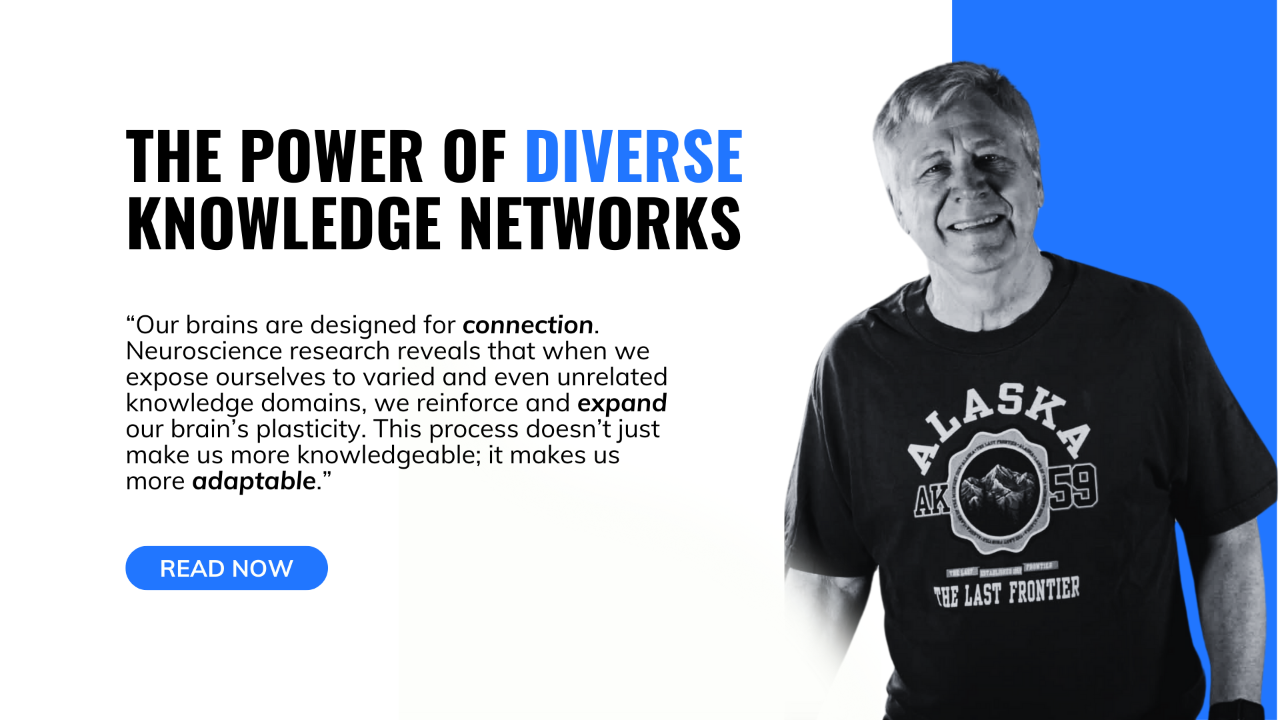Nugget #48 ~ The Power of Diverse Knowledge Networks
Apr 11, 2025
The Power of Diverse Knowledge Networks
In today’s world, strategic problem-solving cannot rely solely on the depth of one discipline. Whether addressing environmental sustainability, cybersecurity, or ethical AI development, the reality is this: most of the challenges we face are messy, complex, and cross-disciplinary. They do not fall neatly within the boundaries of a single knowledge domain. This is precisely why building and participating in diverse knowledge networks has become an indispensable skill for leaders, engineers, scientists, and decision-makers.
Our brains are designed for connection. Neuroscience research reveals that when we expose ourselves to varied and even unrelated knowledge domains, we reinforce and expand our brain’s plasticity—its lifelong ability to rewire itself. This process doesn’t just make us more knowledgeable; it makes us more adaptable. Just as cross-training in sports builds more resilient athletes, engaging with multiple fields of knowledge builds more creative and strategic thinkers.
The implications for transformational leadership are profound. Leaders who expose themselves to a variety of disciplines—not just within the STEM realm but extending into philosophy, history, the arts, and behavioural science—cultivate what might be called “cognitive agility.” This agility enables them to shift perspectives, imagine alternative futures, and detect patterns others might miss. Such leaders don’t merely solve problems—they redefine them
Take for example the fusion of engineering precision with psychological insight. When a systems engineer understands human behavior, the resulting technology is often more intuitive, more humane. Or consider a mathematician with a background in music—someone who intuitively understands patterns and structures but also feels rhythm and flow. They may approach a data analysis problem with a sense of timing and harmony that leads to a surprising solution.
Generalists—those who can swim across knowledge domains—often outperform specialists in environments marked by uncertainty or rapid change. They are less constrained by the fixed structures of any one field and more capable of borrowing, blending, and innovating. The renowned innovation theorist Frans Johansson calls this “the Medici Effect”—the idea that breakthrough ideas often emerge at the intersection of disciplines and cultures.
This doesn’t happen by accident. Cultivating a wide-ranging knowledge network requires intentionality. It means reading broadly, listening to diverse voices, participating in interdisciplinary conversations, and most importantly, staying curious. It demands a visionary mindset—a brain that’s not merely informed, but also capacious and supple. Such a mindset holds multiple ideas in dynamic tension, seeking not just solutions, but better questions.
Leaders in STEM fields who embrace this approach are not only preparing themselves to tackle today’s complex problems—they’re equipping their teams and organizations to thrive in tomorrow’s yet-to-be-defined realities. A robust knowledge network acts like a strategic web: each new connection increases the resilience, reach, and responsiveness of the whole.
So how do we practically apply this insight?
Start small. Attend a lecture outside your field. Read a book that challenges your usual thinking patterns. Collaborate with someone from a different background. Encourage interdisciplinary projects in your teams or classrooms. Over time, these practices build the mental infrastructure for complex, creative, and courageous leadership.
In the end, the power of diverse knowledge networks lies not in accumulating facts from many fields, but in the capacity to synthesize them. The true strength of a leader lies in being a lifelong learner—curious, collaborative, and continually open to the unexpected sparks that emerge when ideas from different worlds collide.
Stimulation for Critical Thinking:
Prompt 1: Reflect on your current knowledge network:
1.1 In what ways does your current professional or personal learning environment expose you to diverse fields?
1.2 Where might you inadvertantly be operating in an echo chamber?
1.3 Identify one actionable step you could take to broaden your knowledge network this month.
Prompt 2: Analyze a real-world problem in your work or business area but through a cross-disciplinary lens: Choose a current challenge—such as climate change, the distraction and confusion of misinformation online, or urban transport design. Now, map out how at least three different disciplines (e.g., engineering, sociology, data science, philosophy) could contribute uniquely to its solution. What synergies or tensions emerge? Can you connect the dots? Capaciously.